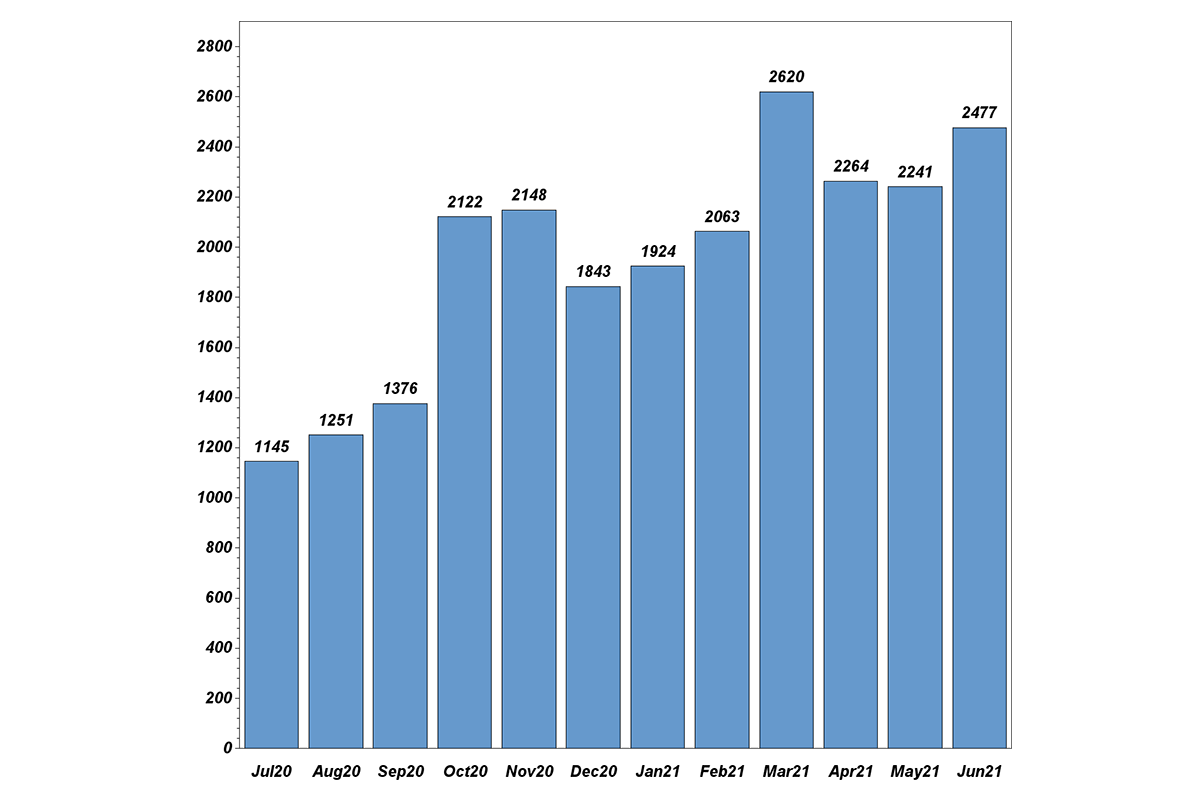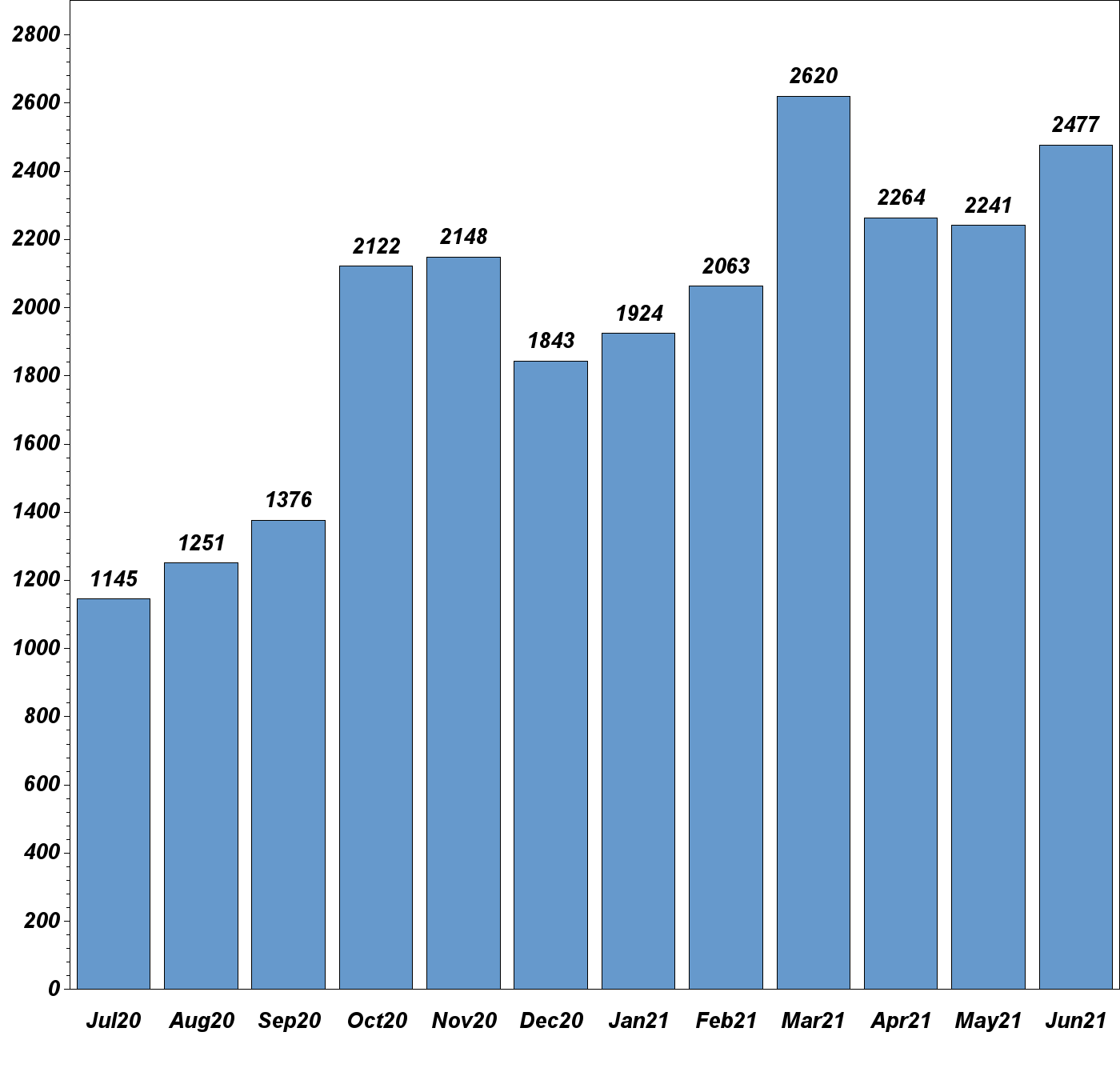
Now Enrolling: EA8192 for Upper Urinary Tract Cancer
July 7, 2021
ECOG-ACRIN Creates Task Force on Advancement for Women
July 7, 2021Trial Updates: TMIST Enrollment Hits 50,000; NCI-MATCH News; Recent Research Results

TMIST Enrollment Hits 50,000 as Leaders Encourage New Sites to Join
The study chair for this trial is Etta Pisano, MD (Beth Israel Deaconess Medical Center, Harvard Medical School, and the American College of Radiology).
Accrual to the TMIST breast cancer screening trial continues at a steady pace, with May enrollment at 2241 and June at 2477. New women are entering the study across the US and internationally. Total enrollment is now at 50,000 as of June 30. New sites may join this trial! If your site is interested in offering this trial to your constituents, email TMIST@acr.org to discuss the study requirements, reimbursement/payment structure, and how to start the application process.

NCI-MATCH Trial News and Updates
The study chairs for this trial are Alice Chen, MD (NCI) and Keith Flaherty, MD (ECOG-ACRIN). The study co-chairs are Lyndsay Harris, MD (NCI) and Peter O’Dwyer, MD (ECOG-ACRIN).
- The latest NCI-MATCH Site Newsletter (June 2021) is now available on the CTSU website. Topics include the new Z1M arm, unique molecular targets of the eleven open arms, Arm H expansion following promising activity, resources for sites, and an NCI-MATCH highlights video that premiered at the Spring Group Meeting. Once on the CTSU website, open the EAY131 protocol page, navigate to the “Documents” tab and then “Education and Promotion.”
- The advocate community was informed of the open treatment arms and their availability for patient enrollment via a feature article in the latest ECOG-ACRIN Advocacy Blog (Spring 2021).
- The advocacy newsletter also highlighted advocates’ role in NCI-MATCH in a recap of the final session of Research Advocacy Network’s Precision Medicine in Oncology Series.
- ECOG-ACRIN encourages investigators and research staff to share these articles with local advocate communities, and to keep NCI-MATCH top-of-mind when considering treatment options for patients.
Research Results
- Breast Cancer – The practice-changing randomized EA1131 trial results show that platinum chemotherapy should not be used to treat patients with basal-like subtype triple-negative breast cancer (TNBC) and more than 1 centimeter of disease remaining in the breast after initial capecitabine chemotherapy. The trial group that received platinum chemotherapy did no better and had a higher number of severe side effects than the capecitabine arm. Across both groups, survival was lower than expected, suggesting that more effective therapies are sorely needed for these patients. These results were published simultaneously with an oral presentation by study chair Ingrid A. Mayer, MD, at the 2021 American Society of Clinical Oncology (ASCO) Annual Meeting. Mayer IA. J Clin Oncol. June 2021
- Kathy D. Miller, MD discusses the results of the EA1131 trial for patients with triple-negative breast cancer in Medscape Oncology: “Capecitabine really was superior therapy, and platinum agents had more toxicity.”
- Breast Cancer – The latest findings from the TAILORx trial for women with early breast cancer, directed by Joseph A. Sparano, MD, show that poor social and physical well-being, along with co-morbid depression, were significant risk factors for premature discontinuation of hormone therapy, as reported by trial participants. Yanez B. JAMA Oncol. June 2021 (e-pub ahead of print)
- Head and Neck Cancer – A secondary analysis from the ACRIN 6685 trial provides a detailed report of lymph node pathology from FDG-PET/CT findings prospectively collected from patients with cN0 head and neck squamous cell carcinoma. ACRIN 6685 is the first study to comprehensively report the incidence, location, and risk of metastases in cN0 in the FDG-PET/CT era. Stack BC. Otolaryngol Head Neck Surg. June 2021
- Kidney Cancer – Important decisions, including treatment protocols, clinical trial eligibility, and life planning, rest on physicians’ ability to predict cancer outcomes accurately. The ECOG-ACRIN Genitourinary Committee introduced a renal cell carcinoma prognostic model for disease recurrence, early progression, and overall survival. The model was validated using prospective and highly annotated outcomes data from the phase III ASSURE trial (E2805). Performance characteristics of the tool exceed the predictive ability of available prognostic models. Correra AF. Euro Urology. July 2021
- Leukemia – Conflicting reports suggest that one gender or the other with acute myeloid leukemia (AML) has a better survival. This analysis examined the prognostic effect of gender on the treatment outcome for 3546 newly diagnosed adults with AML, including 548 patients with acute promyelocytic leukemia (APL) enrolled in 10 multi-institutional treatment trials, including E1490. Wiernik PH. British J of Haematology. June 2021 (e-pub ahead of print)
- Leukemia – Lineage ambiguous leukemias are high-risk malignancies of poorly understood genetic basis. This analysis supports a role for ectopic BCL11B expression in primitive hematopoietic cells mediated by enhancer hijacking as an oncogenic driver of human lineage ambiguous leukemia. Montefiori LE. Cancer Discovery. June 2021 (e-pub ahead of print)
- Leukemia – Despite entering complete remission after chemotherapy, relapse occurs in many patients with acute myeloid leukemia (AML). Thus, there is an urgent need to understand the relapse mechanism in AML and the development of targeted treatments to improve outcomes. This analysis, related to data from study E3903, identified a senescence-like resilience phenotype through which AML cells can survive and repopulate leukemia. Duy C. Cancer Discovery. June 2021. Cancer Discovery highlighted this manuscript in its ‘In This Issue’ feature.
- Prostate Cancer – Correlative data from the CHAARTED study (E3805) demonstrate the utility of transcriptomic subtyping to guide prognostication in metastatic hormone-sensitive prostate cancer and potential selection of patients for chemo-hormonal therapy. This analysis also provides proof-of-concept for biomarker-guided selection of established combination therapies in these patients. Hammid AA. Annals of Onc. June 2021 (e-pub ahead of print)
![ECOG-ACRIN logo[19516]275×75](https://blog-ecog-acrin.org/wp-content/uploads/2021/03/ECOG-ACRIN-logo19516275x75.png)
